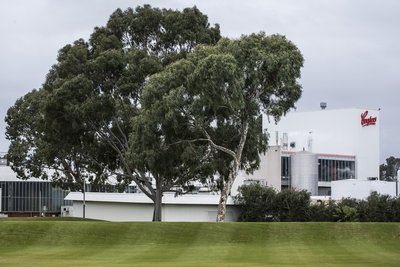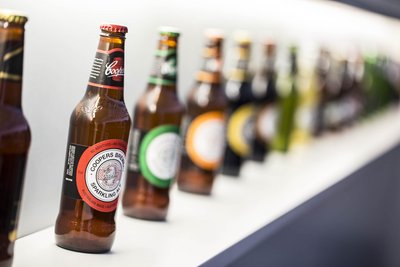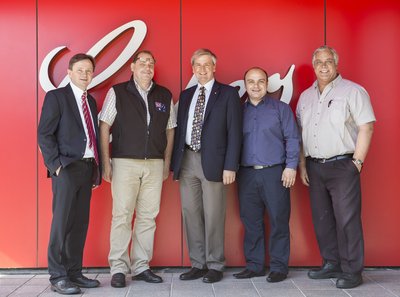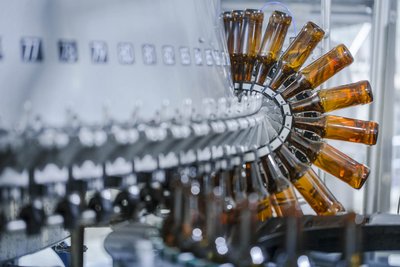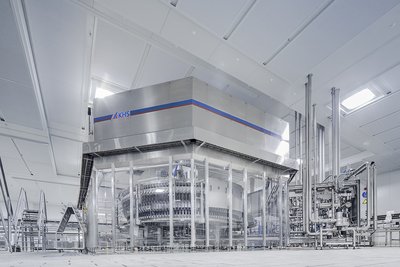
Tailored system for the beverage industry
Bitburger Brewery Group profits from Innoline MES
Wolfgang Heßelmann* In the Innoline MES KHS provides a manufacturing execution system (MES) which is specially tailored to the applications of the beverage industry. For example, the system promotes an increase in the technical efficiency of plant technology and improved production planning. This leads to an efficient supply of materials and a reduction in the number of line downtimes, thus resulting in lower production costs and giving bottlers a clear competitive advantage. KHS based its development of the Innoline MES on the HYDRA MES from MPDV Mikrolab GmbH, one of the leading providers of manufacturing execution systems. The mutual aim of the two companies was to integrate the requirements of the beverage industry into this system. The Innoline MES was to be developed in direct cooperation with a beverage company and adaptations included as standard Innoline MES functions. KHS was able to win the Bitburger Brewery Group as its pilot customer. The Group now has a pioneering position on the market and, according to Dominik Polster, head of Central Project and Process Management for the Bitburger Brewery Group, and Rudolf Wahl, head of the Filling and Filtration Department for the same group, "is profiting on all counts" from the many benefits of KHS' Innoline MES. Much time and expertise invested The project kicked off in 2010 when KHS began looking for a beverage company which was interested in investing both time and expertise in the MES project. The idea was to jointly define which functions an MES would have to include for the beverage industry to give it maximum benefit. At the same time the Bitburger Brewery Group was searching for a suitable partner who could establish a system which made even better use of available production data than had been the case to date – first at its Bitburg site and later at all other Group locations. Says Polster, "The main question for us was whether we should go for a system off the peg, so to speak, which would be relatively quick to implement but have shortfalls we'd then have to live with, or should we invest more time and develop a system together with KHS which is based on standard software but specifically customized to suit our processes by incorporating new developments. We finally decided to invest our time and expertise positively and in return be rewarded with a system which meets our requirements right down to the last detail. The Innoline MES is now giving us excellent service in Bitburg. The next step is to introduce it to the other breweries in the Bitburger Brewery Group." *Head of Line Products, KHS GmbH, Dortmund, Germany. Phone: +49 231 569 1612. Three main goals The Bitburger Brewery Group had three main goals with the project: to optimize its administrative processes; to cut costs through detailed process analysis which pinpoints any weak areas and shows just where improvements can be made; and to produce standardized evaluations which would enable comparisons to be made within the Group. The Innoline MES achieves these goals using four integrated modules for line monitoring, order scheduling, order execution and production analysis. Perfect communication Another key specification for the MES was that it should be able to perfectly communicate with the ERP system – the Bitburger Brewery Group uses SAP – and with various other systems, such as those used by the Logistics department. The Innoline MES fully meets these requirements. Identical data no longer has to be entered into several different systems, with the necessary connections being automatically made through interfaces in the system background. This saves Bitburger personnel time and eliminates any errors in transmission right from the start. Currently in use for the nine filling and packaging lines at the Bitburg brewery At the time of writing the brewery in Bitburg has nine filling and packaging lines connected up to the Innoline MES: five glass lines, a keg line, a premium draft line, a party can line and a recrating line. The MES project, specially customized to meet the demands of the beverage industry, involved specifying functions for the individual modules which went beyond the standard functions of the MES developed by MPDV Mikrolab. The detailed concept was drawn up by KHS and a team of Bitburger Brewery Group experts specially compiled for this project. The reworked modules then had to be implemented on the lines. One successfully established module with a range of added functions followed another. These modules were then extensively tested and – where required – further optimized. Line monitoring module generates line-specific performance indicators The line monitoring module forms the basis of the Innoline MES where performance indicators are generated for the filling and packaging lines. A performance indicator model specifically geared to the specifications of the beverage industry was developed in cooperation with the Bitburger Brewery Group. This model determines which data is automatically retrieved from which source in order to calculate the performance indicators which are selected according to the Weihenstephan standard. These indicators include line efficiency, line availability, average performance and nominal capacity. It is also possible to retrieve performance indicators according to the overall equipment effectiveness or OEE model issued by the Association of the Beverage Machinery Industry (ABMI). What's new here as opposed to the previous setup is that both technical and organizational losses are included in the calculations. The latter are caused by setup processes, maintenance measures, cleaning processes or non-utilized production time, for example. Optimization potential easy to detect Says Polster, "All of the relevant cost groups can be optimized from the conclusions derived from the line monitoring module. For us, it's also very important that the system not only records longer downtimes but also disruptions lasting just a few seconds – with the utmost precision. This is often where potential for optimization is hidden. It would hardly be possible to register mini stops with such accuracy through manual recording." Rudolf Wahl gives us just one example of how useful line monitoring can be when trying to find the cause for disruption. "If I notice that the efficiency of a line isn't meeting our specifications, for example, I can see precisely when there was a drop in performance by looking at the efficiency curve. If I see that efficiency slowed between 7 and 9 am, for instance, I can study all of the machines in the system for this period and quickly see where the problem lay. I used to have to rely on operators writing down which machines failed during which periods. I would then have had to do some detective work and invest a lot of my time. Incidentally, line monitoring also enables us to quickly ascertain whether new materials live up to our expectations or not – which is also another advantage." For instance, the brewery in Bitburg takes delivery of closures from a new crown cork supplier. If, using the new closures, there are more stops in the filler/crowner area than was previously the case, this is indicated directly on screen so that the supplier can also track this information. One of the other positive features of line monitoring is that the work process is eased somewhat as operators no longer have to spend time noting down each and every disruption by hand. "This leaves us more time to concentrate on the actual job – which is the machine, in turn boosting line efficiency," smiles Wahl. Many standard reports for daily use Together with the Bitburger Brewery Group KHS also created a great number of standard performance indicator and fault analysis reports with a clear graphic layout 'for daily use'. These can be accessed at the push of a button. Polster states, "Using these reports we can see which machines on a line are particularly prone to disruption, for example, and then look for the cause and gradually eliminate the sources of error." Wahl adds, "Line monitoring also helps us to recognize how we're placed with our lines in the long term. For instance, with the help of this module we can ascertain whether the performance of our existing lines is able to meet our sales targets for the coming year or whether any individual machines or lines will have to be replaced in the near or distant future." Flexibility has top priority Back to Polster. "All of these examples only go to show how flexible the Innoline MES is. Flexibility was a big topic for us right from the start. We may be concerned about the washer's water consumption one day and interested in the performance of the filler the next. Or want to know the amount of glue used the day after that. We'd like to be able to visualize this. And now we can!" Wahl is also enthusiastic. "Even if we had complaints about a product 12 months after bottling it, for example, we'd be able to see exactly how processes were running at the time by the item number." Order execution module provides order and product-specific data While the line monitoring system enables evaluations on the performance of the various lines to be made, the order execution module provides data on the efficiency, energy consumption, material costs and production times specific to the various orders and products, for instance. Bitburger Brauerei differentiates between make-to-order and make-to-stock products. Make-to-stock products are those that are scheduled according to seasonal demand. These are major products with very low inventory coverage on average which are scheduled according to the turnover predicted by the Sales department. The aim is to always have enough goods in stock so that customers don't have to order well in advance. Make-to-order products, on the other hand, are scheduled based on specific customer orders, such as those destined for export, and also when stock has reached a minimum level in the warehouse. Both customer orders and those which secure the amount of stock on hand are entered in the SAP system. Production orders are then automatically transfered through an interface to the MES (order scheduling) and from there to the order execution module which precisely allocates the data gathered during production to the individual orders. Up until now production orders had to be copied from the SAP system by hand and entered manually into the system used prior to the MES. The operator now simply registers the start and end of a specific production order by pressing a button on the operator panel. If more or less product is made during a production order, the operator can enter this straight into the system. For example, labeling material is soiled and can no longer be used. The MES and SAP are always automatically synchronized. The materials used for the order and product and registered by the order execution module are correctly debited in the SAP system and costs invoiced according to the order and product. This also previously had to be done by hand. The order execution module now synchronizes data automatically through interfaces in the background. Automatic order scheduling with the order scheduling module As the name would suggest, the order scheduling module does just that: it schedules orders! The old procedure at the Bitburg brewery involved scheduling orders on an SAP planning board which had no access to online information. It was therefore always necessary to compare the planned and actual situation on the lines. The order scheduling module now plans orders using a Gantt-chart-based planning board, with clear online graphic displays a given. Any delays are directly registered and scheduling can be adjusted either automatically or manually for follow-on orders. This module schedules orders automatically. In doing so it takes into account any given specifications, such as the availability and speed of the lines, changeover times and product priorities, and is programmed to keep line idle times – as a result of cleaning, for example – to an absolute minimum. The scheduling rules specific to the beverage industry were drawn up and stored together with the Bitburger Brewery Group. At the same time the module retains the option of basing and storing rules on a company's own requirements, with automatic order scheduling customized to suit individual specifications. For instance, at Bitburger Brauerei one blender supplies two lines. The order scheduling module thus contains the information that mixed beer beverages may never be produced on these two lines simultaneously as the capacity of the mixer isn't high enough. Another major aspect of the order scheduling module for the Bitburger Brewery Group was that the suggested planning of the lines can be varied. States Wahl, "In my opinion order scheduling is like a navigation system which suggests possible routes. I can accept the given route or vary it based on my personal experience." If an order is to be deferred, for example, this can be done at any time by making a suitable entry in the system. However, in this case, too, the order scheduling module makes sure that the given rules are strictly adhered to. They can only be violated if the module is given specific instructions to do so and these are confirmed. The following situation could constitute one such conscious breach of the rules. An operator knows that the labels for the order required in two hours' time are on site but not yet registered in the system. He or she therefore doesn't want to allow the order to be postponed to a later time. If the operator approves of and accepts the scheduling implemented by the module, the plan data is automatically fed back into the SAP system. This lets operators know which orders are scheduled for production when; orders for any materials which may still be required can then be triggered accordingly. Before a production order is released, the MES automatically asks the SAP system if the required materials are actually available. Says Polster, "The order scheduling module is very important for us. By comparing various scheduling scenarios we can work out the best weekly schedule for our brewery." Wahl adds, "Drawing up an optimum plan used to be a real chore. Now we have access to the relevant performance indicators in the system, such as processing and setup times, at the press of a button – for all kinds of scenario. It couldn't be better." The order execution and order scheduling modules can also directly indicate how any change in the scheduling data would affect the time and cost of production. Wahl explains. "If the stock of any one product should sink to a critical low due to unforeseen fluctuations in sales, the schedule for this product has to be changed by triggering an additional production order. The system now tells us what effect this extra order has on our weekly schedule and I can deduce how high the additional costs will be." Production analysis module for a full overview KHS incorporated the production analysis module in the MES used by the Bitburger Brewery Group so that comprehensive evaluations can be made. This is a web-based tool with which the user can also access standardized performance indicators from various lines. For example, this module can give operators an overview of the most common reasons for downtimes on the Bitburger brewery's lines or show how the individual lines rank regarding the level of efficiency. Generally speaking, using the production analysis function concise key data can be produced for either an individual line or for a number of systems. When all the breweries in the Bitburger Brewery Group are later equipped with a MES – as planned – the production analysis feature can effect a comparison of the individual breweries' performance indicators, for example. Data access individually defined for each user group The production analysis module is of particular interest to the management as it summarizes data and provides executives with a quick overview of the key performance indicators on all lines. No installed software is required for the production analysis module, with access provided by Internet Explorer. Operators communicate with the MES using a terminal program; shift managers, shift supervisors, the lab and logistics communicate through an Innoline MES client. Which data and which specific areas can be accessed is precisely defined for each user group. In addition to the line monitoring, order scheduling, order execution and production analysis modules the Bitburger Brewery Group has decided to use, the MES also has order material tracking and recipe management features. Order material tracking and recipe management modules for yet more options The order material tracking module uses scanners to accurately record all raw materials, consumables and supplies required for an order. This module helps companies to always track which materials are used for a specific order by reading in barcodes, for instance. Recipe management on the Innoline MES monitors the given process parameters. Here, limits are continuously monitored automatically and operators alerted immediately should these limits be exceeded. Module crosslinks facilitate processes One of the major advantages of the Innoline MES is that it only uses one database. This means that all kinds of crosslinks can be made between the different modules. The system could also display data from the line monitoring module when the order scheduling module is selected, for example. This facilitates operation, is extremely convenient and provides bottlers with a broad range of information. Another big plus is that customers who at first opt for the basic version of the Innoline MES and thus only for the line monitoring module can at a later date simply retrofit further modules as required. Taking part in the pilot Innoline MES project "exactly the right thing to do" Polster is satisfied. "In our view, taking part in the pilot Innoline MES project with KHS was exactly the right thing to do. All of our ideas have been pooled in the project. Our processes have now been optimized just as we wanted them to be." Wahl is also very pleased. "What's important for us is that the system can learn. When we come up with new requirements, we then carry on developing the system with KHS. For example, one of our next projects is to compute key data on filler-relevant disruptions and include this in our Innoline MES. All told, I consider this pilot project to be a real win-win situation. And in the near future the other breweries in the Bitburger Brewery Group are set to benefit significantly, too." Polster concludes, "This is what we're telling the industry. We've presented the Innoline MES at a number of events already and seen that it's generating a lot of interest." It thus comes as no surprise to learn that 15 more Innoline MES packages have already been ordered from KHS and that there are plenty of inquiries for more ...
